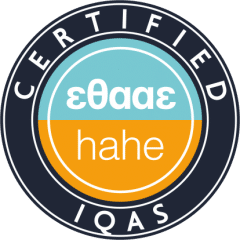Undergraduate Studies
General Direction
The Curriculum provides quality education and ensures up-to-date knowledge. Its goal is to achieve the desired learning outcomes, which enable students to meet the requirements of the specific scientific field and of the labor market.
The objectives of the Curriculum are to:
- Focus on students and their education
- Be inspired by the sense of continuity and complementarity of the fields of knowledge (courses and groups of courses) that it encompasses
- Align with the programs of corresponding departments in Europe
- Meet the needs of the labor market at a national, European and international level
- Respond to the modern scientific challenges of the information industry
- Achieve the learning outcomes and skills required by the European and international environment
- Meet all conditions that will ensure its certification
Academic Direction
The program aims to give students a substantial education in Information Sciences (Library, Archives, Museology) focusing on the allocation, organization and dissemination of information, both in the conventional (analog) and the digital environments. The coding and documentation of information and the utilization of new information technologies are key parameters for the management, exchange, reuse and preservation of materials of any form (text, image, sound, object). Through its core courses, the curriculum focuses on the aforementioned subjects which on the one hand support the individual sciences of information and on the other hand can be utilized forming the common core of the field of information management.
At the same time, the courses on Archives, Librarianship and Museology / Cultural Management examine the respective information organizations, the material and the ways of their management in the general social, educational, economic and cultural environment.
Educational Outcomes
Upon completion of their studies, Department graduates will have the academic knowledge and skills which they can utilize either as individuals or as members of scientific teams, so that they can:
- Manage and document conventional or digital archival, book or museum materials
- Design, organize and manage digital libraries, digital repositories, digital archives and digital materials in general
- Manage archives, libraries and information services of any kind
- Work as professional archivists, librarians and information professionals
- Conduct research in the field of Information Sciences and support research in other scientific fields
- Design and implement information literacy and information retrieval programs
- Design and implement record management programs
- Design and implement programs and promotional activities within the information organizations
- Actively participate in shaping the social, educational and cultural context of information organizations
- Provide information services
- Develop information tools and products necessary for research, management and society
- Implement collaborative schemes between information organizations in conventional and digital environments
Connecting to the labor market
For the shaping of the curriculum, and in accordance with the international practice, the established professional environment is taken into account. There is an interactive relationship, which is fueled by the presence of the Department’s graduates in the labor market. The department is the oldest (and with the highest national exam score requirements for admission among similar departments) in the country and the one that has shaped the Library culture in Greece. The department has a strong presence in the labor market with graduates who work in both private and public sector services: public and private libraries, corporate libraries, academic libraries, historical and contemporary (active) archives, information companies and organizations, information centers, digitization and documentation programs, data management programs, etc. As far as museums are concerned, they employ graduates mainly for the documentation and digital management of their collections and/or for the creation of digital museum infrastructures. The relationship of the department with the labor market is strengthened further by an internship program. Furthermore, departmental activities are organized around its Information Management Research Laboratory. The research laboratory, a departmental tool for securing cooperation with the information industry, focuses on applied research projects on the organization and management of information, the creation of information tools and participation in national and European competitive research programs.
The department conducts continuous research on the professional status of graduates, as well as research on the quality and effectiveness of its Internship program. This research is utilized for the continuous improvement of the curriculum.




